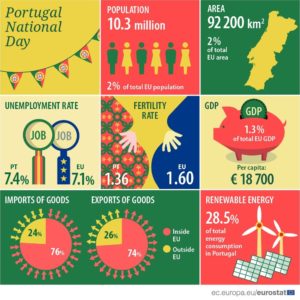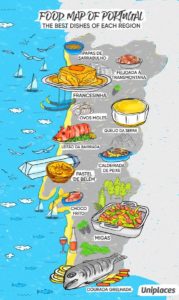It is tempting to sigh once in a while ‘strange fellows, those Portuguese’, just like cartoon character Obelix did at the time of Julius Caesar when he used to grumble ‘ils sont fous, ces Romain’.
 If you are what you eat (drink, smoke) or love (males, females, yourself), then countries certainly aren’t the same. There are after all innumerous appetites and lifestyles. For example, health club membership is twice as high in Spain and three times higher in Denmark.
If you are what you eat (drink, smoke) or love (males, females, yourself), then countries certainly aren’t the same. There are after all innumerous appetites and lifestyles. For example, health club membership is twice as high in Spain and three times higher in Denmark.
Portugal, on the other hand, has the highest wine consumption in the world and its population devours the most fish in the EU.
 Portuguese people take 4744 steps a day, far less than the Chinese in Hong Kong or even their Spanish neighbours. Two-thirds are not physically active, in particular, low-skilled women. Hence, more than half of the population is overweight and 7% obese.
Portuguese people take 4744 steps a day, far less than the Chinese in Hong Kong or even their Spanish neighbours. Two-thirds are not physically active, in particular, low-skilled women. Hence, more than half of the population is overweight and 7% obese.
 Portuguese adore cars – one in every two owns one – and use them every day. For everything: commuting, shopping, and outings. Unfortunately, these motorists hardly ever use public transport and are keen to make phone calls while driving.
Portuguese adore cars – one in every two owns one – and use them every day. For everything: commuting, shopping, and outings. Unfortunately, these motorists hardly ever use public transport and are keen to make phone calls while driving.
![]() Anti-smoking campaigns aren’t successful at all and overall smoking hasn’t declined in 30 years.
Anti-smoking campaigns aren’t successful at all and overall smoking hasn’t declined in 30 years.
Strangely enough, highly educated women smoke most.
But do these people then only have bad habits?
 Apparently not. Portuguese people love their culture and are– besides Fado, Football, and Fatima – fond of grilled sardines, Pessoa, Saramago, sunny weather and popular saints. They also work a lot – make much more hours a week than the Dutch and Germans – and enjoy fewer holidays than the average European.
Apparently not. Portuguese people love their culture and are– besides Fado, Football, and Fatima – fond of grilled sardines, Pessoa, Saramago, sunny weather and popular saints. They also work a lot – make much more hours a week than the Dutch and Germans – and enjoy fewer holidays than the average European.
Moreover, they serve piles of food to family and friends and it is impossible to leave a restaurant unsatisfied! These folks have an open mind, to their compatriots, and to the world. They are well informed and know how to enjoy Spanish tapas, Brazilian music, Japanese sushi, French cinema, German books, and Chinese medicine. Although they initially show a somewhat timid approach, they are very helpful and always there for you. Friendships aren’t superficial but for life.
 The most stunning, however – at least according to the Observer – are the eyes of their men. Wherever you are in the world, you should look at their eyebrows. ‘If they are breath-taking, then the fellow must be Portuguese’.
The most stunning, however – at least according to the Observer – are the eyes of their men. Wherever you are in the world, you should look at their eyebrows. ‘If they are breath-taking, then the fellow must be Portuguese’.
Bom fim de semana Enjoy the weekend (pic Lusa/SAPO/Público)

